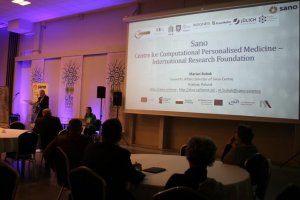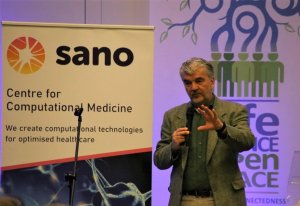
The official inauguration of the Sano Centre for Computational Medicine took place on 26 November, at the Life Science Open Space 2019 conference organized by Klaster LifeScience Kraków. The establishment of Sano will directly contribute to the advancement of science in our region through new scientific projects and world-class educational opportunities for postgraduate students. It will also foster knowledge and technology transfer by supporting new start-ups in the area of advanced technologies. The Centre’s influence will stretch beyond the region and will also be felt on the international stage, contributing to further development of modern medicine and thereby to improving the quality of medical care.

At the conference, during a special session titled “Digital Health – Sano”, representatives of the Centre presented the Centre’s aims and goals, as well as examples of activities which may be undertaken in collaboration with potential partners. The session was attended by researchers and entrepreneurs, with talks delivered by representatives of leading European universities: the University of Amsterdam, the University of Bologna and the University of Sheffield – as well as Silesian and German research institutes. Also represented were international computing research centres, Polish institutions involved in medical research and commercial entities (KCRI, AstraZeneca, TriNetX, QSAR Lab), each of which showcased its innovative projects and identified the added value which may emerge from collaboration with Sano. The list of attendees included both Polish and foreign nationals, with representatives of the European Commission also in attendance.

Keynote lecture was delivered by Peter Sloot, Professor of computational science and Complex System Simulation of the Institute for Advanced Studies, University of Amsterdam. Marian Bubak – the Scientific Affairs Director of Sano – officially inaugurated the Digital Health session. The session itself included the following presentations:
- Scientific program of Sano – Marco Viceconti, Chairman of the Sano International Scientific Committee (ISC), Bologna University
- From research to clinical decision support tools – Rod Hose, member of Sano ISC, University of Sheffield, UK
- Transfer of research results to hospital practice? My experience in the development of non-invasive intraoperative imaging for the surgery – Claire Chalopin, member of Sano ISC, Innovation Center Computer Assisted Surgery (ICCAS), Universität Leipzig, Germany
- Trends in computing infrastructures and computer simulations – Norbert Attig, Deputy head of the Jülich Supercomputing Center
- About experience of the Professor Zbigniew Religa Foundation of
Cardiac Surgery Development (FRK) – Zbigniew Nawrat, member of Sano, ISC, FRK Zabrze - CompBioMed Scientific Program – Andrew Narracott and Peter Coveney
- Drug discovery from intramolecular voids perspective – Artur Góra, Tunneling Group, Center of Biotechnology, Silesian University of Technology
- Medical device of future innovation / device development – Łukasz Partyka, KCRI Sp. z o. o.
- Replacing Site-Based Exercise Tests with Wearable Activity Monitors to Reduce Patient Burden and Time to Signal Detection – Jesper Havsol, Informatics Science Director at AstraZeneca
- Using Machine Learning to Design Better Clinical Trials – Andrzej Nowojewski, AstraZeneca
- Digital Pathology and Artificial Intelligence applied to Precision Medicine – Michel Vandenberghe, AstraZeneca
- TriNetX – Data-Driven Approach to Clinical Trial – Marta Chodorek, TriNetX, Inc. Research & Real-World Evidence
- Chemoinformatics in Nanomedicine – Tomasz Puzyn, QSAR Lab Sp. z o. o.
The National Centre for Research and Development (project coordinator) co-organized the Sano session as well as a press conference devoted to the Centre’s mission and goals.
Significant contribution to the establishment from Sano comes from the Foundation for Polish Science, which provides funding for the Centre under its International Research Agendas Programme. The aim of this activity is to support establishment of new Polish research units headed by eminent scientists from around the world, where teams consisting of Polish and foreign scientists representing various disciplines would be able to carry out cutting-edge research and development work.


